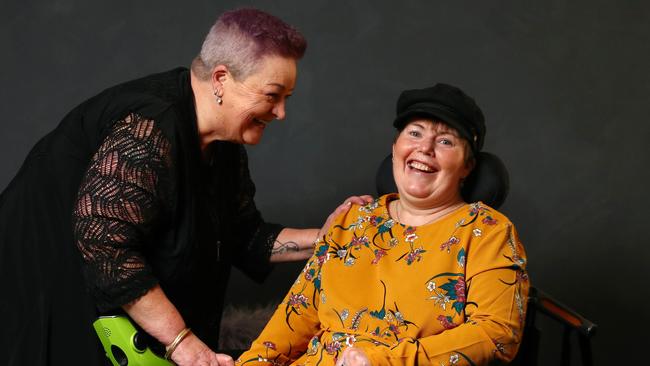Young waste away in aged care
Putting her daughter Sarah, 39, into aged care was wrenching for Lyn Brady, but not as upsetting as the two years that followed.

Putting her 39-year-old daughter Sarah into residential aged care was wrenching for Lyn Brady, but not as upsetting as the two years that followed.
A rare form of leukodystrophy had seen Sarah’s physical and cognitive condition deteriorate in a few short years, and her family's love, care and financial resources couldn’t cope.
“She’d get out of bed then fall over and hit her head. We'd find her on the ground in the morning,” Lyn said.
“There was no NDIS yet, and we just didn’t have the money for the constant care she needed.”
Yet her entry into an aged-care facility, the family’s last option, saw her health trajectory dive even faster. “On her first day, she was put in high care, the dementia area, sharing a room with a 95-year-old woman who couldn't speak,” Lyn said. “She wasn’t yet 40. It was really hard for me to walk out and leave her there.
“Going in, Sarah could use the toilet by herself, but almost immediately they put her in a nappy so staff wouldn't have to attend to her. She was also put in a wheelchair where she sat for hour after hour and soon lost the ability to walk. There was no mental stimulation or physical stimulation whatsoever. The staff just didn't have time.”
The aged-care royal commission will examine stories such as Sarah’s in hearings from Monday as it turns its attention to the 6000 Australians aged under 65 living in aged care.
Australian Institute of Health and Welfare figures show 2500 younger people enter aged care each year, with similar numbers leaving. Two in three of those leaving have either turned 65 or died, with just 10-15 per cent finding suitable housing, including specialist accommodation or returning to their family’s home, with the right supports. The government in March committed to halving the number of people under 65 entering aged care by 2025 through changes to specialist disability accommodation rules and faster decision-making.
Bronwyn Morkham, national director of Young People in Nursing Homes Australia, said the staffing numbers and skills in residential care were not designed for the needs of younger people.
“These people have complex needs that require specialist care. To get three or four staff to take care of a person’s morning routine, that’s simply not going to happen in a nursing home,” Ms Morkham said.
In comparative terms, Sarah is one of the lucky ones. A hard-won NDIS package that came through late in 2018 allowed her to return to the family home with carer support, but Lyn remains upset with her daughter's treatment.
“Her journey was certainly not helped by her time there,” she said.




To join the conversation, please log in. Don't have an account? Register
Join the conversation, you are commenting as Logout